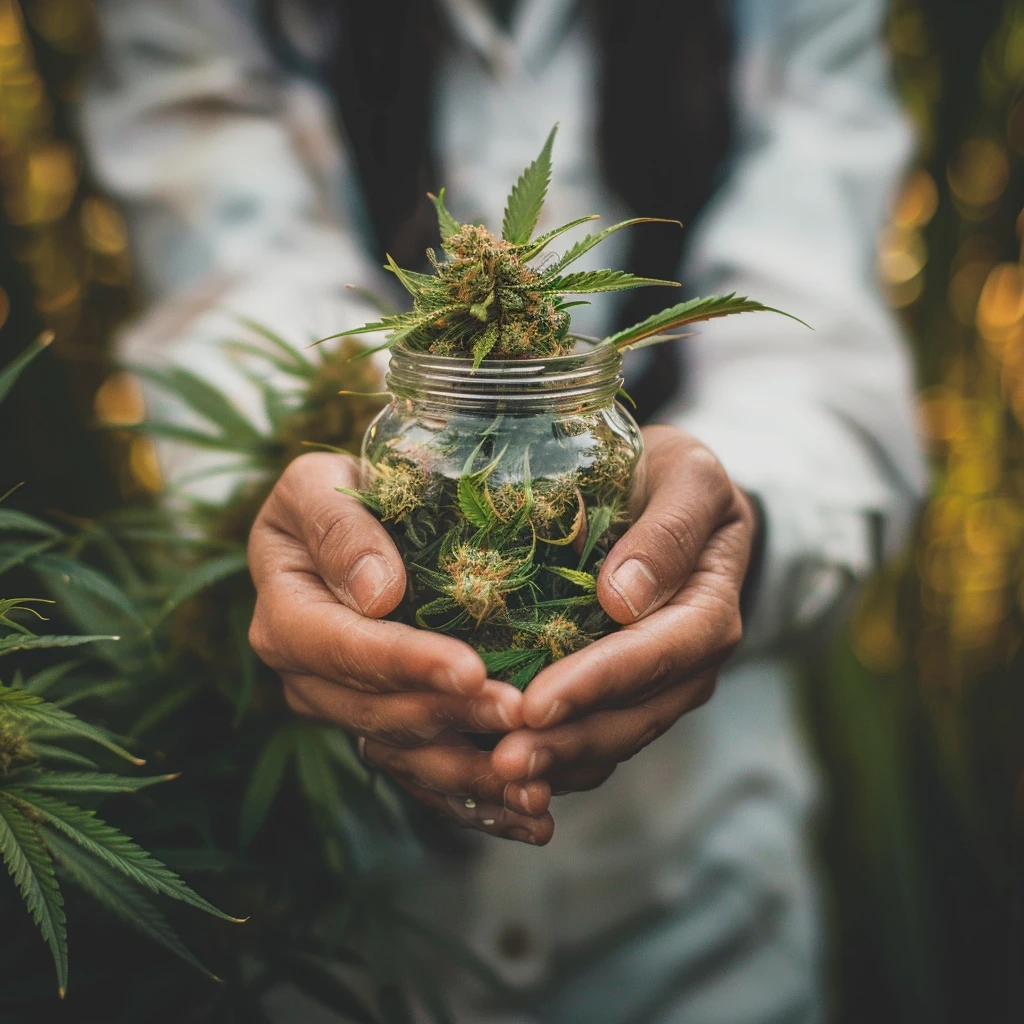Post-traumatic stress disorder (PTSD) remains one of the most challenging mental health conditions, arising from the shadows of traumatic experiences and profoundly affecting millions of lives. Traditional treatments, while effective for some, often leave others seeking alternatives to cope with the debilitating symptoms of PTSD, such as severe anxiety, nightmares, and uncontrollable thoughts about the traumatic event. Emerging as a beacon of hope in this complex landscape, medical cannabis presents a promising therapeutic avenue, offering a natural path to healing and recovery.


Table of Contents
ToggleThe Burden of PTSD: Understanding the Impact
PTSD is a mental health condition triggered by experiencing or witnessing a terrifying event. Symptoms can include flashbacks, nightmares, severe anxiety, as well as uncontrollable thoughts about the trauma. The traditional approach to PTSD treatment often involves psychotherapy, medication, or a combination of both, aimed at managing symptoms rather than addressing the root cause. However, for many patients, these methods can fall short, driving a quest for more holistic and integrative treatment options.
Cannabis: A New Frontier in Mental Health
The reevaluation of cannabis and its place in the medical world has led to a renewed interest in its benefits, particularly in the field of mental health. Cannabis’s potential to alleviate both physical and psychological symptoms has made it a compelling choice for PTSD treatment, where conventional therapies can often be ineffective or lead to undesirable side effects.


How Cannabis Can Help Treat PTSD
Cannabis’s role in treating PTSD is multifaceted, involving the endocannabinoid system (ECS), which is crucial in maintaining body balance and regulating mood, memory, and fear extinction. Cannabinoids like THC (tetrahydrocannabinol) and CBD (cannabidiol) interact with this system, potentially alleviating the symptoms of PTSD by restoring endocannabinoid balance and enhancing mental health.
Modulating Memories and Emotions
One of the hallmarks of PTSD is the intense and often debilitating re-experiencing of traumatic events through nightmares and flashbacks. THC has been observed to reduce the emotional impact of traumatic memories by altering the way the brain processes these memories, which can be pivotal in reducing the frequency and severity of these episodes.
Enhancing Fear Extinction
Fear extinction is a process by which an individual learns to dissociate a stimulus from a traumatic response. Cannabis has been shown to facilitate this process, particularly through the action of CBD, which enhances the signaling of the neurotransmitter anandamide, known for its ability to ease fear and anxiety. This mechanism is critical in therapy for PTSD, which often involves forms of exposure therapy aimed at fear extinction.
Alleviating Anxiety and Insomnia
For many suffering from PTSD, anxiety and insomnia are persistent symptoms that significantly impair daily functioning and quality of life. Cannabis, especially strains high in CBD, has been found to have potent anxiolytic and sleep-inducing effects. CBD helps regulate cortisol levels, a stress hormone closely linked to anxiety levels, and promotes relaxation and sleep, addressing two of the most challenging aspects of PTSD.


Implementing Cannabis in PTSD Treatment
While the therapeutic potential of cannabis is compelling, its integration into PTSD treatment protocols requires careful consideration of individual patient profiles, symptoms, and overall mental health goals.
Tailored Treatment Strategies
Effective cannabis treatment for PTSD involves personalized strategies that consider the specific symptoms and treatment responses of each individual. This might mean selecting strains with particular THC to CBD ratios or adjusting dosages and methods of administration to optimize therapeutic outcomes without exacerbating symptoms.
Delivery Methods and Dosage
The method of cannabis delivery can significantly influence its effects. Inhalation (smoking or vaporizing) provides rapid relief of acute symptoms, while oral ingestion (oils, edibles) offers longer-lasting effects that may be more suitable for managing chronic symptoms like anxiety and insomnia. Topical applications, while less common for PTSD, can also be beneficial for localized physical symptoms related to stress and anxiety.
Challenges and Considerations
Navigating the use of cannabis for PTSD treatment involves addressing several challenges, including legal barriers, the stigma surrounding cannabis use, and the need for more extensive clinical research to solidify dosing guidelines and long-term safety profiles.
The Road Ahead
As research progresses and societal acceptance grows, the role of cannabis in treating PTSD and trauma-related symptoms is expected to expand. For many, cannabis offers not just relief but a chance for a renewed life, free from the heavy shadows of trauma. In embracing this natural therapy, both patients and clinicians are forging a new path in mental health treatment, marked by compassion, innovation, and an enduring commitment to healing the invisible wounds of trauma.
FAQ: Medical Cannabis for PTSD and Trauma Treatment
How does medical cannabis help with PTSD?
Medical cannabis helps manage PTSD by interacting with the body’s endocannabinoid system, which regulates mood, memory, and fear responses. Cannabinoids like THC and CBD can modulate the retrieval of traumatic memories, reduce anxiety, aid in fear extinction, and improve sleep patterns, which are all crucial for individuals with PTSD.
Can cannabis cure PTSD?
No, cannabis does not cure PTSD. It is used to manage and alleviate symptoms associated with PTSD, helping to improve quality of life for those affected. Effective PTSD treatment typically involves a combination of therapies, including psychotherapy, with cannabis serving as a supportive treatment to alleviate symptoms.
What symptoms of PTSD can cannabis treat?
Cannabis is particularly effective in treating symptoms such as severe anxiety, insomnia, flashbacks, and other stress-related symptoms associated with PTSD. It can help diminish the emotional impact of traumatic memories and promote a general sense of calm and well-being.
Are there specific cannabis strains that are more effective for treating PTSD?
Yes, certain cannabis strains may be more effective for PTSD depending on the dominant cannabinoids. Strains high in CBD are often recommended for their anxiety-reducing and anti-inflammatory properties without significant psychoactive effects. Strains with a balanced THC:CBD ratio are sometimes preferred for their ability to manage both anxiety and depressive symptoms.
What is the best way to use cannabis for PTSD?
The best way to use cannabis for PTSD depends on the individual’s symptoms and treatment goals. Inhalation (smoking or vaporizing) provides quick relief from acute symptoms, while edibles or oils might be better for long-term symptom management due to their longer duration of effect. Personalized treatment plans should be discussed with a healthcare provider.
Are there any risks associated with using cannabis for PTSD?
Potential risks include cognitive impairment, dependency, and the possible exacerbation of symptoms such as paranoia or anxiety, particularly with high doses of THC. It’s important to start with low doses, particularly with THC, and to monitor effects closely under the guidance of a healthcare provider.
How do I start using cannabis for PTSD treatment?
Starting cannabis treatment for PTSD should involve consultation with a healthcare provider experienced in both cannabis and mental health treatment. This ensures proper dosing, strain selection, and integration with other ongoing treatments.
Can anyone with PTSD use medical cannabis?
While many people with PTSD may benefit from medical cannabis, it is not suitable for everyone. Individuals with a history of psychosis or adverse reactions to cannabis may not be ideal candidates. It’s crucial to evaluate each case individually.
Is medical cannabis legal for PTSD treatment?
The legality of medical cannabis varies by location. In places where it is legal, it often requires a prescription or certification from a healthcare professional. Always check local laws and regulations regarding medical cannabis use.
What should I consider before choosing cannabis as a treatment option for PTSD?
Consider the legal status of cannabis in your area, potential side effects, your current health condition, and how cannabis interacts with other medications you might be taking. Discussing these factors with a healthcare provider will help determine if cannabis is a suitable option for your PTSD treatment.
These FAQs aim to provide clarity and guidance for individuals considering medical cannabis as part of their PTSD treatment plan, emphasizing informed decision-making and professional oversight to maximize benefits and minimize risks.
Kannabu's Online Cannabis Educational Resources
Read Educational Online Guides and Articles to Learn About Cannabis
- Navigating the Green Path: CBD vs. THC in Medical Treatment
- The Aromatic Architects of Healing: The Role of Terpenes in Medical Cannabis
- Navigating the Green Frontier: Clinical Trials on Cannabis and Its Effects
- Charting the Green Path: Cannabis Dosing Guidelines for Medical Use
- The Endocannabinoid System: Nature’s Balancing Act in Human Health
- A Green Horizon: Cannabis as an Alternative to Opioids
- Navigating the Mind’s Garden: Cannabis and Mental Health Treatment
- Unlocking the Green Code: Exploring the Genetic Diversity and Pharmacological Promise of Cannabis
- Weaving Green into Gold: The Integration of Medical Cannabis into Traditional Medicine
- The Therapeutic Promise of Medical Cannabis: Exploring the Spectrum of Cannabinoids
- From Young to Old: The Compassionate Embrace of Medical Cannabis in Pediatric and Geriatric Care
- Green vs. Traditional: Navigating the Crossroads of Medical Cannabis and Conventional Therapies
- Beyond the Pain: The Comparative Effectiveness of Cannabis in Chronic Pain Management
- Unlocking Cannabis’s Secrets: The Journey Through Cannabinoid Pharmacokinetics and Pharmacodynamics
- Green Paws: Navigating the Frontier of Medical Cannabis in Veterinary Care
- Unlocking Relief: The Transformative Role of Medical Cannabis in Pain Management
- Harnessing Harmony: Medical Cannabis and the Battle Against Autoimmune Disorders
- Embracing the Night: How Medical Cannabis Transforms Sleep Management
- Turning the Tide: Cannabis as a Catalyst for Relief and Recovery in Nausea and Appetite Stimulation
- Illuminating the Neural Pathways: The Transformative Role of Medical Cannabis in Neurological Conditions
- Harnessing Harmony: Medical Cannabis and the Battle Against Autoimmune Disorders
- A Clearer View: Medical Cannabis in the Treatment of Glaucoma
- Breaking Boundaries: Cannabis and the New Frontier in Epilepsy and Seizure Control
- Revolutionizing Relief: Medical Cannabis in Cancer Symptom Management
- Navigating the Storm: Cannabis as a Beacon of Hope in Multiple Sclerosis Treatment
- Cannabis: A Natural Respite for Arthritis and Joint Pain
- Healing from Within: The Role of Medical Cannabis in Treating Gastrointestinal Disorders
- Healing Invisible Wounds: Cannabis in PTSD and Trauma Treatment
- Balancing the Mind: The Potential of Medical Cannabis in Bipolar Disorder and Mood Stabilization
- Illuminating the Mind: Cannabis in the Treatment of Alzheimer’s and Neurodegenerative Diseases

